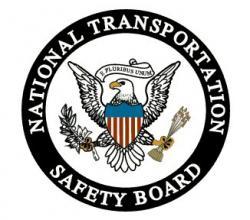Wed, Jan 24, 2007
The Fallout From A 2004 Pinnacle Airlines Crash
Continues...
 On October 14, 2004, a Pinnacle
Airlines flight crew, repositioning a Bombardier CRJ-200 (file
photo of type below) from Little Rock to Minneapolis, crashed after attempting to
take the aircraft to its service ceiling, stalled it and flamed out
both engines.
On October 14, 2004, a Pinnacle
Airlines flight crew, repositioning a Bombardier CRJ-200 (file
photo of type below) from Little Rock to Minneapolis, crashed after attempting to
take the aircraft to its service ceiling, stalled it and flamed out
both engines.
The NTSB published a laundry list of causes for the crash, but
in the narrowest possible terms, the crew's unprofessional
behavior, deviation from standard operating procedures and poor
airmanship led directly to the flame-out and subsequent crash.
Now, a new list of safety recommendations from the NTSB for the
FAA indicates the crash and death of the two pilots may not have
been entirely in vain. The NTSB found deficiencies in the crew's
training as regards the high-altitude stall, the double-engine
flame out, the engine restart attempts and planning for the
emergency landing.
Below is the unedited list of NTSB recommendations
for the FAA:
- Work with members of the aviation industry to enhance the
training syllabuses for pilots conducting high altitude operations
in regional jet airplanes. The syllabuses should include methods to
ensure that these pilots possess a thorough understanding of the
airplanes' performance capabilities, limitations, and high altitude
aerodynamics.
(A-07-1)
- Determine whether the changes to be made to the high altitude
training syllabuses for regional jet airplanes, as requested in
Safety Recommendation A-07-1, would also enhance the high altitude
training syllabuses for all other transport-category jet airplanes
and, if so, require that these changes be incorporated into the
syllabuses for those airplanes. (A-07-2)
- Require that air carriers provide their pilots with
opportunities to practice high altitude stall recovery techniques
in the simulator during which time the pilots demonstrate their
ability to identify and execute the appropriate recovery technique.
(A-07-3)
- Convene a multidisciplinary panel of operational, training, and
human factors specialists to study and submit a report on methods
to improve flight crew familiarity with and response to stick
pusher systems and, if warranted, establish training requirements
for stick pusher-equipped airplanes based on the findings of this
panel. (A-07-4)
- Verify that all Canadair regional jet operators incorporate
guidance in their double engine failure checklist that clearly
states the airspeeds required during the procedure and require the
operators to provide pilots with simulator training on executing
this checklist. (A-07-5)
- Require regional air carriers operating under 14 Code of
Federal Regulations Part 121 to provide specific guidance on
expectations for professional conduct to pilots who operate
nonrevenue flights. (A-07-6)
- For those regional air carriers operating under 14 Code of
Federal Regulations Part 121 that have the capability to review
flight data recorder (FDR) data, require that the air carriers
review FDR data from nonrevenue flights to verify that the flights
are being conducted according to standard operating procedures.
(A-07-7)

- Work with pilot associations to develop a specific program of
education for air carrier pilots that addresses professional
standards and their role in ensuring safety of flight. The program
should include associated guidance information and references to
recent accidents involving pilots acting unprofessionally or not
following standard operating procedures. (A-07-8)
- Require that all 14 Code of Federal Regulations Part 121
operators incorporate into their oversight programs periodic Line
Operations Safety Audit observations and methods to address and
correct findings resulting from these observations. (A-07-9)
- Require that all 14 Code of Federal Regulations Part 121
operators establish Safety Management System programs.
(A-07-10)
- Strongly encourage and assist all regional air carriers
operating under 14 Code of Federal Regulations Part 121 to
implement an approved Aviation Safety Action Program and an
approved Flight Operational Quality Assurance program.
(A-07-11)
More News
Aero Linx: International Business Aviation Council Ltd IBAC promotes the growth of business aviation, benefiting all sectors of the industry and all regions of the world. As a non->[...]
"During the annual inspection of the B-24 “Diamond Lil” this off-season, we made the determination that 'Lil' needs some new feathers. Due to weathering, the cloth-cove>[...]
Also: Bushcat Woes, Hummingbird 300 SL 4-Seat Heli Kit, Carbon Cub UL The newest Junkers is a faithful recreation that mates a 7-cylinder Verner radial engine to the airframe offer>[...]
Also: Seaplane Pilots Association, Rotax 916’s First Year, Gene Conrad After a decade and a half of struggling with the FAA and other aero-politics, G100UL is in production a>[...]
Also: Martha King Scholarship, Montaer Grows, Textron Updates Pistons, FlySto The FAA is hiring thousands of air traffic controllers, but the window to apply will only be open for >[...]
 ANN's Daily Aero-Linx (04.16.24)
ANN's Daily Aero-Linx (04.16.24) Aero-News: Quote of the Day (04.16.24)
Aero-News: Quote of the Day (04.16.24) Airborne 04.10.24: SnF24!, A50 Heritage Reveal, HeliCycle!, Montaer MC-01
Airborne 04.10.24: SnF24!, A50 Heritage Reveal, HeliCycle!, Montaer MC-01 Airborne 04.12.24: SnF24!, G100UL Is Here, Holy Micro, Plane Tags
Airborne 04.12.24: SnF24!, G100UL Is Here, Holy Micro, Plane Tags Airborne-Flight Training 04.17.24: Feds Need Controllers, Spirit Delay, Redbird
Airborne-Flight Training 04.17.24: Feds Need Controllers, Spirit Delay, Redbird




